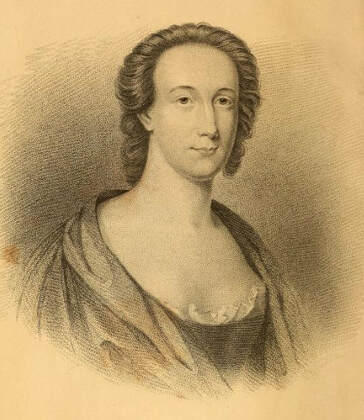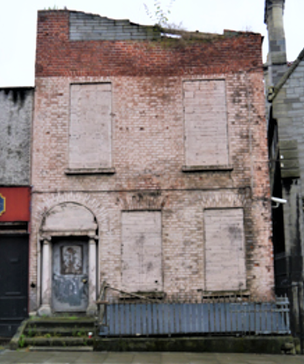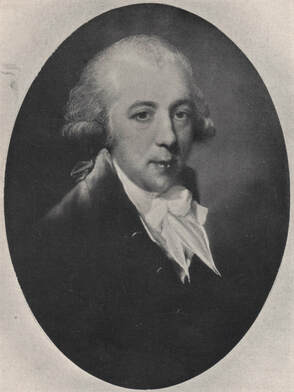|
Early discouragement and encouragement Frances Chamberlaine – or Miss Fanny as she was styled – was born in 1724 to a family of English extraction. Her mother (formerly Whyte) died soon after Frances was born and her father, Dr Philip Chamberlaine, was an Anglican minister and long-time rector of the Church of St Nicholas Within in Dublin city, where the family lived. As an infant, Frances suffered an accident and thereafter, was slightly lame needing assistance on long walks. While an admired preacher, Dr Chamberlaine was considered an eccentric by many and among his greatest aversions was female education. Writing, he considered, was wholly unnecessary for females as he claimed that this knowledge could only lead to the ‘multiplication of love-letters’ (Lefanu 1824, 4). Despite his opposition to his daughter’s education, Frances’ affectionate brothers helped with her studies by stealthily providing her with reading and writing materials. In particular, her eldest brother Walter instructed her in writing and Latin, while her brother Richard taught her botany. Frances herself went on to tutor a young male outcast in her father’s parish who was considered incapable of instruction; she succeeded in teaching him to read and repeat prayers. At the young age of fifteen, unknown to her father, Frances composed Eugenia and Adelaide, a romance in two volumes. This was written on her father’s coarse, discoloured paper used for the household accounts. It was published posthumously without her name and, later, this comic drama was successfully adapted for the stage by her eldest daughter. Next, Frances tried her hand at writing a couple of sermons. Theatrical disputes Dr Chamberlaine’s mental health began to deteriorate around the same time as Frances entered adulthood, which allowed her some extra freedom. She occasionally accompanied her brothers to the theatre; before this, she could not attend as her father strongly objected to such forms of entertainment. It was there that Frances first set eyes on Thomas Sheridan, a highly educated Anglo-Irish actor and theatre manager from Co. Cavan. Interestingly, his father was a close friend of Jonathon Swift and Thomas was his godson. Thomas had been enjoying a degree of success in Dublin’s Theatre Royal (i.e. Smock Alley Theatre in Temple Bar) but this was overshadowed in January 1746 by a series of events which became known as ‘Kelly’s Riot’. This was sparked when Mr Kelly from Galway forced his way behind the scenes of the theatre in an attempt to pursue the celebrated Irish actress George Anne Bellamy. Thomas valiantly came to her aide rebuking Kelly upon which a scuffle broke out involving the two men. Kelly, claiming he had been beaten by Thomas, gathered together a band of his friends who vowed to avenge him; they returned on a number of occasions to the theatre to deal out threats and carry out outrages. Others in literary and college circles began to publicly display solidarity with Thomas. This included Edmund Burke, a student at the time and later a renowned political theorist remembered in particular for his support of Catholic Emancipation. A paper written in Thomas’ favour and outlining his theatrical difficulties with the public was published in Faulkner’s Dublin Journal on 25 January 1746, which was followed up by an anonymous pamphlet filled with poetical verses penned by Frances. Despite every attempt made to defend Thomas, a riot took place in the theatre one night when he was set to perform on stage in a charity play. This disturbance led to a series of arrests and Thomas was tried for assaulting Kelly but was immediately acquitted on the grounds that Kelly had provoked him. Kelly was then also tried, found guilty, fined £500 and received a three-month prison sentence. The fine was remitted on Thomas’ request and, interestingly, Thomas stood as solicitor and bail for the same man who had once threatened his life. His popularity, and that of the theatre which he managed, increased significantly as a result of this act of generosity. Domestic life and more rioting The impressive pamphlet championing Thomas’ cause ultimately led to an introduction between him and Frances once the riots had come to a conclusion. The couple were soon married in 1747. They lived comfortably at no. 12 Upper Dorset Street in Dublin but also spent time in Thomas’ homestead in Cavan; Thomas had purchased this country residence called Quilca from his brother and it was here that Frances was at her happiest. Between 1747 and 1758, Frances gave birth to six children. Sadly, one of their sons (Sackville) died as an infant while their eldest child (Thomas) died at the age of three. Frances’ maternal tenderness has been often commented upon, and it has also been acknowledged that she excelled in every aspect of domestic affairs (Lefanu 1824, 48, 88). Her seemingly calm, composed disposition and affectionate nature helped to forge pleasant childhood memories in the minds of each of her children who reached adulthood. In the 1740s and 1750s, Frances devoted herself to raising her young family which left little time for writing. In the early years of their marriage, Thomas continued his role as manager of Smock Alley and became a revolutionary figure in the development of theatre in Ireland. But it was not long before Thomas again found himself engulfed in drama after forming an elite theatrical club of intellectuals (mainly politicians), which was commonly dubbed the ‘Beef-Steak Club’. Unusually for the time, the Irish actress Margaret (Peg) Woffington was elected president of the club in 1753. She was known for her dislike of her own gender, declaring that ‘the conversation of women consisted of nothing but silks and scandal’ (Lefanu 1824, 53). Given the involvement of political figures in the club, non-members working in theatre as well as members of the public began to display dissatisfaction. Thomas insisted on the professional dignity of actors by removing audience members from the stage and directed the actors not to repeat speeches attacking the government as demanded by the public in the course of stage performances. His instructions, however, fell on deaf ears. Some have claimed that Thomas was not a courtier and allowed the actors to perform such speeches at their own discretion, while others have commented that he attempted to censor the actors. Whatever the case, rioting erupted at the theatre one night in March 1754, largely prompted by the actor Mr Digges who was known for disobeying the manager’s commands. Feeling threatened, Thomas quickly exited the building and set off home, while much of the property inside the theatre was being destroyed as the rioters searched in earnest for him. Before he had arrived home, the news of the riots had already reached his family. A servant, exaggerating the events, informed Frances that the theatre was in flames and her husband’s life in eminent danger. She was then heavily pregnant with Sackville and it was believed, at the time, that this shock experienced by Frances was the cause of the little infant’s premature death just three months later. On hearing of the outrages, the Duke of Dorset offered Thomas a generous annual pension of £300 but he declined believing that it would only serve to reinforce the idea that he was cosy with the government. Believing that public opinion was against him, Thomas gave up the management of the theatre and let it for two years. He then moved to England, leaving behind his wife and children, but returned to Ireland in 1756 and resumed his duty as theatre manager. By this time the dust had settled and he was welcomed back by his theatrical colleagues. Frances was by now spending much of her time at a retreat in Glasnevin, where she could enjoy her children’s company and they could all breathe cleaner country air. But the family’s fortunes were set to turn once again with the opening of a new theatre in Dublin in 1757. Many of Thomas’ best performers moved to this establishment, and naturally much of the regular Smock Alley audience followed. For some time now, Thomas had been turning his attentions to literary pursuits and so without too much difficulty, he once again left the theatre. Frances and Thomas, accompanied by their son Charles Francis, headed for London but the other two children (Richard and Alicia) remained in Ireland in the care of relations and later boarded in a newly opened grammar school on Grafton Street, now the site of Bewleys, run by Frances’ cousin Samuel Whyte. About a year and a half later, the Sheridans sent for their children to join them in their new home on Henrietta Street in Covent Garden. Life in London and a return to writing In 1758, in London, Frances gave birth to a baby girl, the only one of their offspring born in England. Thomas was now busy perfecting his system for teaching English elocution, while he was also enjoying a degree of stage success in Drury Lane Theatre, alongside the renowned David Garrick although there were tensions and rivalry between the two actors. In England, Frances found herself surrounded by a distinguished circle of friends, among them the writer Samuel Richardson who encouraged her to write after perusing her early novel Eugenia and Adelaide. Another who greatly supported Frances in re-igniting her literary talent was author Sarah Fielding, the sister of novelist Henry Fielding. With this encouragement, Frances returned to writing thereby producing The Memoirs of Miss Sidney Biddulph, which was written in diary format and faithfully paints a picture of the life of a middle-class female in the mid-18th century. During the course of composing this work, Frances looked upon Richardson as her guide and only told her husband about the novel after it was completed. It is said that she placed a small trunk beside her while writing wherein she hid the manuscript whenever Thomas entered their home. The text was published in 1761 and became an instant success, soon being translated into French. A friend of the family, the distinguished writer Samuel Johnson (better known as Dr Johnson) humorously remarked upon its content, ‘I know not Madam ! that you have a right, upon moral principles, to make your readers suffer so much’ (Lefanu 1824, 113). To date, The Memoirs of Miss Sidney Biddulph remains her best-known work and several editions have been published. By 1762, Thomas was receiving a £200 annual pension on the grounds of his literary merits which indicates the royal favour shown to him. He was now engaged in rewriting the English dictionary, while the family were spending much of their leisure time in Windsor. They enjoyed walking in Windsor Park, and on one occasion the eldest daughter, Alicia, innocently brought home a fawn which she had found in the Royal enclosures, a hanging offence no less! That summer in Windsor, Frances began to write her first comedy and theatrical essay, The Discovery. She read it to Garrick who stated that it was ‘one of the best comedies he ever read’ (Moore 1825, 2). He begged her to permit him to perform it on stage. By this time, Frances’ health was deteriorating and she was experiencing intervals of illness. In February 1763, The Discovery was first performed to great success for the public at Drury Lane, with both Thomas and Garrick playing parts. Frances soon finished another comedy entitled The Dupe but this never experienced any great success. Unfortunately, Thomas was now away on business in Dublin and in his absence, she most keenly felt this blow to her literary career. This disappointment and his absence prompted her to write the poem ‘Ode to Patience’. Thomas returned to England in the spring of 1764 which lifted her spirits once again. Frances then toured with him as he gave lectures on oratory in Bath, Bristol and Edinburgh. On one occasion, she returned on her own to London where one night while deeply engrossed in reading in bed, her curtains caught fire. Thankfully, the blaze was quickly extinguished but thereafter Frances never indulged in reading in bed by candlelight. Literary pursuits in FranceIn September 1764, the Sheridan family moved to France on account of the cost of living being considerably less there. All of the children emigrated except Richard who was left in the care of Dr Robert Sumner, a master at Eton and later headmaster at Harrow. Settling eventually in the city of Blois, the family lived a rather quiet life due to their financial struggles as their affairs were now somewhat disordered. Because France was a Catholic country, Thomas established a Church of England service for his family read by him every Sunday, which attracted a small Protestant congregation. Nevertheless, the family integrated well, befriending and regularly visiting Catholic clergy, including Fr Mark, an Irish Capuchin priest. The children exchanged gifts with friendly nuns in the neighbourhood, and Frances was taught music by a Jesuit on the Spanish guitar. During their first year living at Blois, the mild climate seemed to improve Frances’ state of health, allowing her to resume writing. Over two years she delved into the genre of the oriental tale composing The History of Nourjahad, an instructive moral fiction promoting the idea that true happiness depends on the regulation of the passions, rather than on outward prosperity. The idea for this poetical work came to her as she mused on the inequalities of men. It was published posthumously in 1767 and enjoyed considerable popularity; it was translated into French, Russian and Polish, and later dramatised by Sophia Lee, author of a series of Canterbury Tales. Also, during her time in Blois, Frances added two additional volumes to The Memoirs of Miss Sidney Biddulph, the second and third volumes only being released after her death. She also wrote another comedy, A Trip to Bath, but this was never fully completed, although Garrick expressed interest in staging it. Decline in health and untimely death In autumn 1766, Thomas was set to make an extended visit to Ireland but Frances and the children were to remain in Blois. Frances planned to spend her time, while separated from her husband, teaching her eldest daughter. Their impending separation, however, which obliged Frances to remain in a foreign country, the language of which she imperfectly understood, played heavily on her mind. A few days before Thomas was to leave, Frances was suddenly seized with a fainting fit and a low fever. Thomas decided against leaving as he witnessed her strength rapidly decline. For two weeks, she issued domestic orders from her sickbed and retained her senses until the day before her death. It is recorded that she passed away peacefully at the age of forty-two in the presence of her loving husband. She was buried in a private cemetery owned by a Protestant family, just outside Blois. The funeral entourage was escorted by a procession of military men but it took place at night by torchlight to avoid any conflict with Catholics, though some Catholics did form part of the party of dragoons. Her legacy Frances Sheridan’s legacy cannot simply be summed up by analysing her literary output, which is regrettably rather small, but needs to consider the achievements of her children to whom she devoted herself wholeheartedly. Three of them followed in their mother’s footsteps. Richard Brinsley Sheridan (1751–1816) became a world-famous playwright, poet and satirist, and his mother’s incomplete and unperformed play A Trip to Bath had a huge influence on his work and is said to have inspired his comedic play The Rivals. Richard was also a politician and although he left Ireland at the age of eleven, he campaigned for Irish independence, developed ties with the United Irishmen, and devoted himself to the cause of Catholic Emancipation. As a result of her own upbringing during which she was forced to study in secret, Frances had always placed great importance on the education of her daughters, and both her daughters also wrote. The eldest, Alicia Sheridan Lefanu (1753–1817), wrote a play, Sons of Erin, which was produced in London in 1812, while the journals of Frances’ youngest daughter, Anne Elizabeth (Betsy) Sheridan Lefanu (1758–1837), were published in 1960. Much of this article is based on the biography of Frances Sheridan which was published in 1824, and written by her granddaughter, Alicia Lefanu, also a poet. These female Irish writers remain largely understudied. Sources
Elwood, Mrs. 1845. ‘Lives of the literary ladies of England’. Smith's Weekly Volume, vol. 1, pp. 174-244, at pp. 191-92. Evening Herald, 15 Apr. 1964, p. 19. Lefanu, A. 1824. Memoirs of the Life and Writings of Mrs Frances Sheridan. London. Available to view here: https://archive.org/details/memoirsoflifewri00lef Moore. T. 1825. Memoirs of the Life of the Right Honourable Richard Brinsley Sheridan. Vol. 1, 2nd ed. London. NIAH, 12 Dorset Street: http://www.buildingsofireland.ie/niah/search.jsp?type=record&county=DU®no=50060595# Watkins, J. 1818. Memoirs of the Public and Private Life of the Right Honorable R. B. Sheridan. Vol.1, 3rd ed. London. Webb, A. 1878. A Compendium of Irish Biography. Available to view here: https://www.libraryireland.com/biography/FrancesSheridan.php
3 Comments
Claire Vernell
7/21/2020 08:16:19 am
my ancestors were Sheridan's of Ennistymon. Difficult to find anyone who was related to them.
Reply
Herstoric Ireland
7/26/2021 09:36:02 am
Thanks for reading our article Claire. Best of luck with your family tree research, keep with it – it’s difficult but very rewarding!
Reply
anonymousert
10/15/2023 11:23:11 pm
Difficult to find anyone who was related to them.
Reply
Your comment will be posted after it is approved.
Leave a Reply. |
Herstoric IrelandImmerse yourself in the history of Irish women here! Archives
March 2019
Categories
All
|




 RSS Feed
RSS Feed
